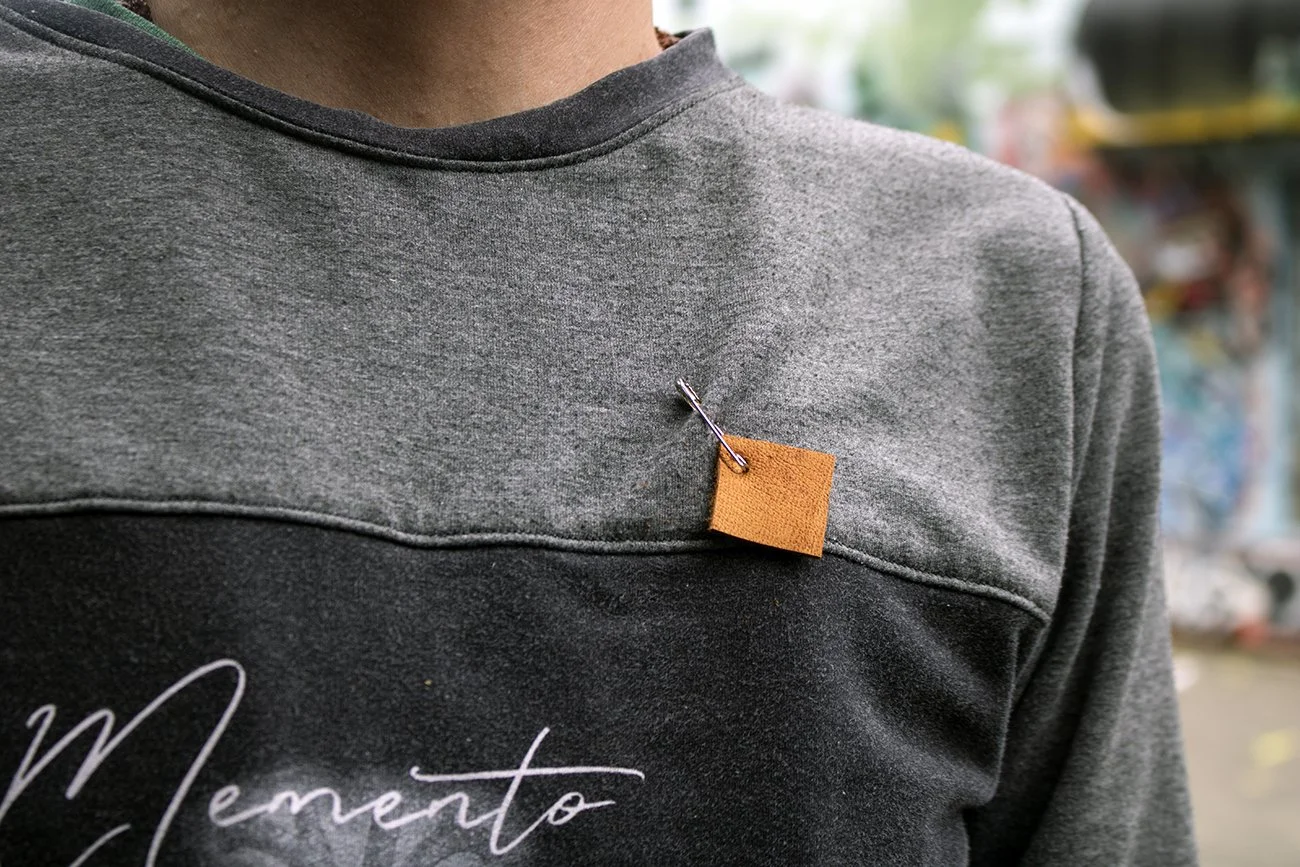Vancouver Island University recognized by Moose Hide Campaign for awareness around gender-based violence
Johnsrude (pictured) said the Moose Hide Campaign is about people making the commitment to have conversations around gender-based violence. Photo: Lauryn Mackenzie / CHLY 101.7fm
Vancouver Island University has been recognized for its work on campus raising awareness around gender-based violence.
For eight years, Vancouver Island University (VIU) has been working with the Moose Hide Campaign, a campaign for Indigenous and non-Indigenous men to stand up against violence towards women and children.
The campaign started in Northern British Columbia along the Highways of Tears in 2011, where Paul Lacerte and his daughter Raven came up with the idea to have people wear a small square piece of moose hide, taking the pledge to end gender based violence.
Now, VIU is being recognized for their work in bringing the Moose Hide Campaign to campus and offering resources and conversations on how students can take the pledge.
The campaign has designated VIU as an official Ambassador Campus for the university’s ongoing work of bringing the campaign’s mission to campus.
Danielle Johnsrude is the director for the Center for Experiential Learning and Student Engagement at VIU and oversees the Moose Hide Campaign on campus.
She came by CHLY’s studio to speak about the campaign and the university's recent designation.
“It's not just the day that we're celebrating, but it is around the conversations and culture of understanding that we have built on our campus around gender based violence and reconciliation,: Johnsrude said.
Those who took the pledge are then asked to have at least five conversations with people about the topic. Photo: Lauryn Mackenzie / CHLY 101.7fm
Johnsrude said the Moose Hide Campaign is about people making the commitment to have conversations around gender-based violence, and it is their job at VIU to make sure there are safe and inclusive spaces on campus for students to do so. Those who took the pledge are then asked to have at least five conversations with people about the topic.
“It kind of threads all the way through to our different programming, so it really is like you'll see the postcard sitting at a workshop table,” Johnsrude said. “We'll kind of open it up and talk a little bit about what that is, and then if people are interested that they can go online, learn a little bit more about the moose hide campaign, and then continue the conversations with friends.”
Along with having the moose hide pins and a postcard explaining the campaign readily available across all three VIU campuses, the campaign is also highlighted during RockVIU, an orientation for new students that happens at the start of the fall semester.
VIU has also previously sent students to attend and participate in Moose Hide Campaign Day in Victoria, observed annually on the third Thursday of May. They have also hosted an event on campus at the Shq’apthut—also known as the Gathering Place—where people can watch the livestream of the day’s events.
She said it is important to bring the campaign to post-secondary campuses, as anything that can stop any gender based violence and start conversations around what's happening behind the scenes is important.
“I think if you can start openly talking about issues like this, it creates a safe space where people can have more conversations and then get referred to people that can help in those cases. It becomes a culture of an institution to say, ‘hey, we know these things do happen, and we want to talk about them,’” Johnsrude said. “When students are at the forefront of talking about that, it's things that matter to them, and I think that's what and why the campaign has moved forward so well, is because students were at the heart of bringing it into our campus, and then they're the ones that are keeping the conversation going.”
She also highlighted how bringing awareness to the Moose Hide Campaign and gender-based violence follows the Calls to Action of the Truth and Reconciliation Commission of Canada and the recommendations of the National Inquiry into Missing and Murdered Indigenous Women and Girls.
She said that by creating safe spaces, she has had many conversations with students who may not have ever talked about gender-based violence or reconciliation before.
“I've had international students who may have had gender-based violence in their home country, or are new to what the [Truth and Reconciliation Commission] is in Canada, and what has happened with Indigenous communities,” she said. “Then they have shared in stories with me how it was one of the most meaningful days that they got to be a part of, because it opened their eyes to a different perspective that they had never seen before. Isn't that what coming to university is about is to open our perspective to what is going on and how we can be a part of creating solutions to systemic issues.”
Johnsrude said having the Moose Hide Campaign at VIU not only creates learning journeys for everyone on campus, but also healing journeys.
“They talk about it being a simple thing to just put on a pin and to begin a conversation,” Johnsrude said. “We estimate 40,000 pins have been given out at VIU, which, if everybody's sticking to the five-person conversation, that's around 200,000 conversations at our three different campuses: Cowichan, tiwšɛmawtxʷ and the Nanaimo campus.”
More information about the Moose Hide Campaign can be found at moosehidecampaign.ca.
Funding Note: This story was produced with funding support from the Local Journalism Initiative, administered by the Community Radio Fund of Canada.


